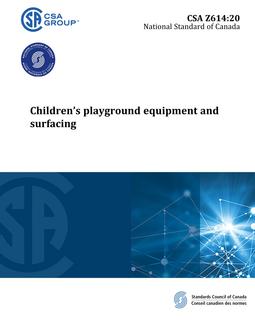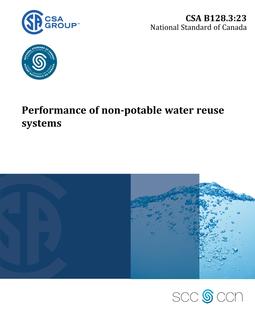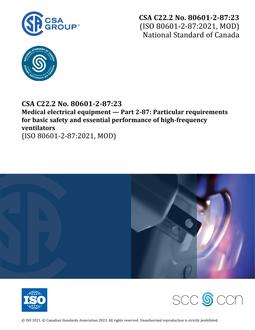
CSA Z614:20
Click here to purchase
Preface:
This is the sixth edition of CSA Z614, Children’s playground equipment and surfacing. It supersedes the previous editions, published in 2014, 2007, 2003, 1998, and 1990 under the title Children’s playspaces and equipment.
Changes to this edition include the following:
a) added a clause and supporting Annex J to allow for new play components that might not specifically fit into the prescriptive play component types listed in this Standard;
b) modified the user age groups to account for children of different abilities;
c) expanded on the developmental needs of children;
d) changes to the acceptability of various surfacing materials where the fall height is not greater than 450 mm;
e) climbing net structures requirements have been harmonized with ASTM F1487;
f) updated Annex H to improve clarity and make changes to the elevated component counts;
g) updated Table G.1; and
h) added a new annex on thermal comfort (Annex K).
This Standard has been developed in compliance with Standards Council of Canada requirements for National Standards of Canada. It has been published as a National Standard of Canada by CSA Group.
Scope:
1.1
This Standard provides requirements for public-use playground equipment intended for use by children aged 18 months to 12 years, with anthropometric limits based on the 95th percentile.
Notes:
1) The level of challenge required and desired by children varies enormously with age, physical development, and emotional development; therefore, it is almost impossible to design a piece of playground equipment that meets the needs of all children. Children younger than 18 months and children aged 13 years and older do not usually use the equipment covered in this Standard.
2) The sixth year of a child’s life (when the child is five years old) is accepted as a transitional year. Consequently, the requirements in this Standard are split into two age groupings: 18 months to 5 years and 5 years to 12 years. The overlap of the 5-year-old child is deliberate and acknowledges the transitional nature of the sixth year of life.
1.2
This Standard takes into account the physical size, special characteristics, and developmental needs of children so that appropriate and challenging play experiences are provided.
1.3
This Standard applies to outdoor public-use playground equipment found at schools, parks, childcare facilities, institutions, multiple-family dwellings, private resorts and recreation developments, restaurants, and other areas of public use. See Clause 3.
1.4
This Standard contains recommendations on technical requirements and practices applicable to the design, manufacture/construction, installation, maintenance, and inspection of public-use playground equipment and its related spaces. The provider of each of these areas is responsible for meeting the applicable requirements and recommendations of each, but it is the owner/operator’s responsibility to confirm if the requirements and recommendations of this Standard are followed.
1.5
This Standard is intended to promote and encourage the provision and use of playgrounds that are well designed, well maintained, innovative, and challenging and, in so doing, contribute to the development of healthy children.
1.6
The requirements of this Standard are intended to minimize the likelihood of life-threatening or serious injuries by mitigating the identified hazards typically presented in various types of playground environments and play components.
Note: Annex J provides references for learning more about hazard identification and risk/benefit assessments and examples of playground-focused applications.
1.7
This Standard applies to
a) public-use playgrounds built, protective surfacing installed, and public-use playground equipment manufactured after the date of publication of this edition; and
b) additions to, and replacement parts for, public-use playgrounds installed after the date of publication of this edition.
1.8
This Standard provides requirements for outdoor public-use playground equipment in a playground that is provided for children for play, although, in some cases, this playground equipment was not originally produced for that purpose. Other objects or furnishings in a playground not primarily intended for play, such as fences, benches, tables, landscape elements, independent shade structures, borders intended to contain protective surfacing, and plant and natural materials, are not covered. Loose play materials are also not covered.
Note: The equipment configurations shown in the figures in this Standard are examples only. Configurations other than those shown can be designed and built to meet the requirements specified in the clauses of this Standard.
1.9
This Standard does not apply to the following:
a) sport, fitness, or gymnasium environments;
b) slides that end in water;
c) soft, contained play equipment that has controlled public access, such as that provided in commercial establishments (e.g., restaurants and department stores);
d) play equipment intended for backyard use;
e) amusement rides;
f) family daycare as defined by provincial/territorial childcare regulations; and
g) adventure playgrounds as defined in the following note.
Note: Adventure playgrounds are a specific type of non-commercial playground. They are fenced and secured and have constant supervision during use by “playworkers”. They are characterized by a developmental approach supporting free play; the absence of adult-built playground equipment; and the provision of construction materials, tools, and loose parts.
1.10
In this Standard, “shall” is used to express a requirement, i.e., a provision that the user is obliged to satisfy in order to comply with the Standard; “should” is used to express a recommendation or that which is advised but not required; “may” is used to express an option or that which is permissible within the limits of the Standard. Notes accompanying clauses do not include requirements or alternative requirements; the purpose of a note accompanying a clause is to separate from the text explanatory or informative material. Notes to tables and figures are considered part of the table or figure and may be written as requirements. Annexes are designated normative (mandatory) or informative (non-mandatory) to define their application.
1.11
The values given in SI units are the units of record for the purposes of this Standard. The values given in parentheses are for information and comparison only.
Unless otherwise specified, a tolerance of ±2% is applied to each dimension presented in this Standard.
Product Details
- Edition:
- 6th
- Published:
- 03/01/2020
- ISBN(s):
- 9781488327551
- Number of Pages:
- 218
- File Size:
- 1 file , 5.6 MB
- Product Code(s):
- 2427873, 2427873


